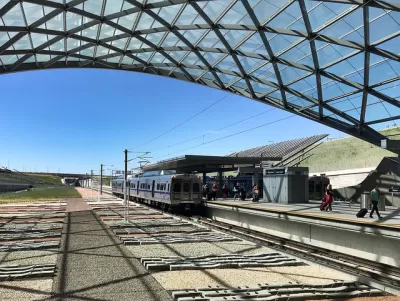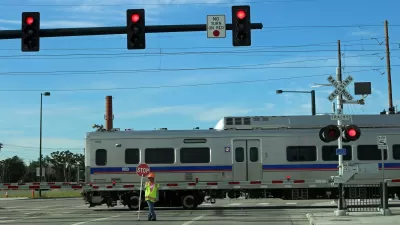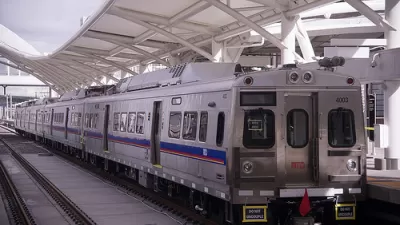The problems caused by crossing gates for the new A and B Lines are so serious that the Federal Railroad Administration had threatened to close both lines on Nov. 5. They granted the Regional Transit District a 90-day waiver.

Who would have guessed that the nation's newest commuter rail lines would be plagued by problems that most riders don't even consider?
Denver's "train to the plane," known as the University of Colorado A Line, opened to wide acclaim on Earth Day this year. The electrified commuter rail line was the first to be built that included the costly positive train control system whose absence has been blamed in many deadly trains incidents, including the September crash of a New Jersey Transit train in Hoboken, N.J.
Ridership quickly exceeded projections on the A-Line, but problems were evident, as noted in one of the many posts (listed below) on the two new commuter rail lines built and operated under a public-private partnership for the Denver area Regional Transit District (RTD):
While the A Line has some of the operating features of heavy rail, such as operating frequency, hours of operation, and level boarding, not all grade crossings are separated, and that can create problems when power is lost, such as during lightning strikes.
"RTD workers are still at 10 train crossings along the A-Line route to make sure gates are working properly, said RTD spokesman Nate Currey [on June 13].
More extensive problems at the crossings, which are also used by Union Pacific Railroad, particularly with the crossing gates, were detailed by [The Denver Post's Montey Whaley and John Aguilar] last month.
Those crossing gate problems had caught the attention of the Federal Railroad Administration (FRA) which had threatened shutdown of both commuter lines. The RTD issued a bulletin on Nov. 2 indicating a 90-day extension of their waiver:
The Federal Railroad Administration (FRA) has granted the Regional Transportation District (RTD) and its contract builder and operator Denver Transit Partners (DTP) an extension of their waiver, allowing for continued operation of University of Colorado A Line and B Line.
Under the waiver extension, FRA noted that DTP must implement the items contained in the plan that was presented to FRA staff last Friday, Oct. 28 in Washington, DC. In addition, RTD and DTP will hold twice weekly progress meetings with the FRA Region 6 staff and will schedule monthly face-to-face progress meetings with the FRA in Washington, DC.
It turns out that "flaggers", i.e., appropriately trained personnel, have been in place at grade crossings at both lines since their inceptions.
Since opening in April, the University of Colorado A Line has operated with flaggers at each of the crossings to monitor and control traffic in case the gates stay down too long. The B Line, which opened in July, had a flagger in place at the one crossing on that line. The flaggers will remain in place until all actions are completed to correct crossing gate down time and other issues.
- Colorado Public Radio: Feds Grant RTD An Extension, Avoiding Closure Of A, B Commuter Lines, Nov. 2, 2016
- Colorado Public Radio: RTD Trying To Avoid Possible Closure Of A, B Train Commuter Lines, Oct. 27, 2016
- Denver's B Line to Westminster Now Open for Service, July 27, 2016
- Opening of Denver's B Line Bittersweet for Commuters From Northwest Suburbs, July 18, 2016
A Line
- Denver's New Commuter Train to the Plane Achieves Record Ridership, June 18, 2016
- More Kudos for Denver's Rail Network and Newest Rail Line, May 23, 2016
- Earth Day Special: First Electrified Commuter Rail Lines Opens in Over a Century, April 23, 2016
-
Denver's New Commuter Rail Line to Airport to Open in April, October 26, 2015

Planetizen Federal Action Tracker
A weekly monitor of how Trump’s orders and actions are impacting planners and planning in America.

San Francisco's School District Spent $105M To Build Affordable Housing for Teachers — And That's Just the Beginning
SFUSD joins a growing list of school districts using their land holdings to address housing affordability challenges faced by their own employees.

The Tiny, Adorable $7,000 Car Turning Japan Onto EVs
The single seat Mibot charges from a regular plug as quickly as an iPad, and is about half the price of an average EV.

Seattle's Plan for Adopting Driverless Cars
Equity, safety, accessibility and affordability are front of mind as the city prepares for robotaxis and other autonomous vehicles.

As Trump Phases Out FEMA, Is It Time to Flee the Floodplains?
With less federal funding available for disaster relief efforts, the need to relocate at-risk communities is more urgent than ever.

With Protected Lanes, 460% More People Commute by Bike
For those needing more ammo, more data proving what we already knew is here.
Urban Design for Planners 1: Software Tools
This six-course series explores essential urban design concepts using open source software and equips planners with the tools they need to participate fully in the urban design process.
Planning for Universal Design
Learn the tools for implementing Universal Design in planning regulations.
Smith Gee Studio
City of Charlotte
City of Camden Redevelopment Agency
City of Astoria
Transportation Research & Education Center (TREC) at Portland State University
US High Speed Rail Association
City of Camden Redevelopment Agency
Municipality of Princeton (NJ)




























